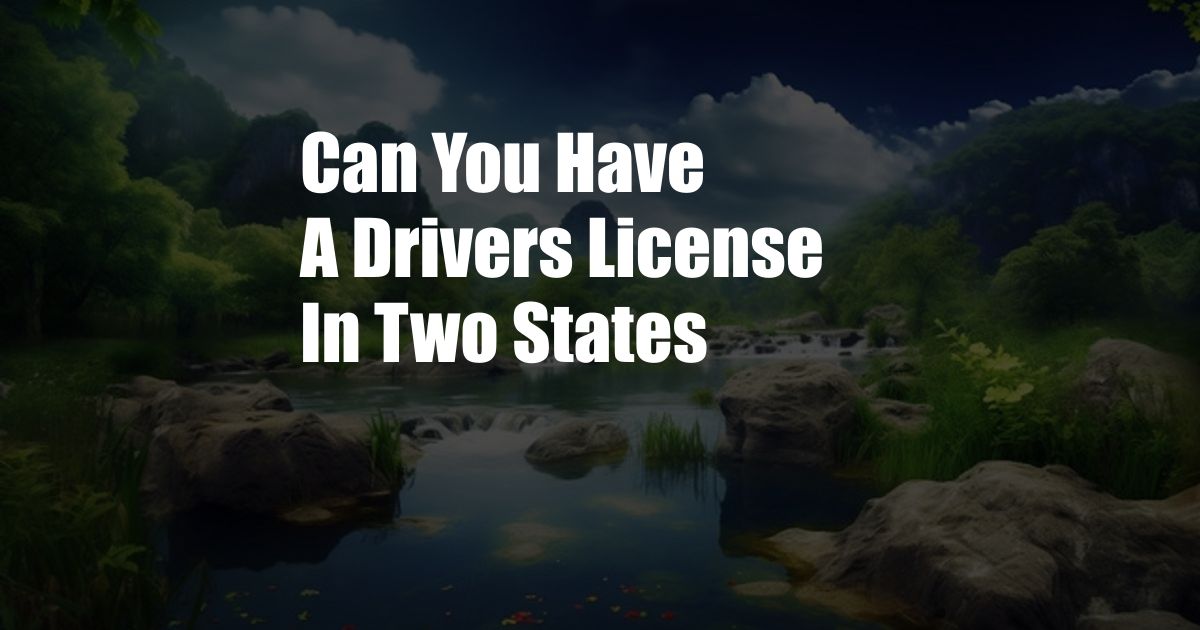
Can You Have a Driver’s License in Two States?
In the United States, it is generally not legal to hold a driver’s license in two different states. Each state has its own laws and regulations regarding driver licensing, and it is important to comply with the requirements of the state in which you reside.
There are a few exceptions to this rule. For example, some states allow residents who work in another state to obtain a driver’s license in both states. Additionally, some states have reciprocity agreements with neighboring states, which allow residents of those states to drive in either state with a valid driver’s license from their home state.
What Happens if You Get a Driver’s License in Two States?
If you get a driver’s license in two states, you may be subject to penalties in both states. These penalties can include fines, driver’s license suspension, and even jail time.
In addition to the legal consequences, getting a driver’s license in two states can also create confusion and inconvenience. For example, you may have to keep track of two different license numbers and expiration dates. You may also have to pay fees in both states.
How to Avoid Getting a Driver’s License in Two States
The best way to avoid getting a driver’s license in two states is to only apply for a license in the state where you reside. If you move to a new state, you should surrender your old driver’s license and apply for a new one in your new state.
If you are not sure whether you are eligible for a driver’s license in two states, you should contact the driver’s license bureau in each state.
What if I Already Have a Driver’s License in Two States?
If you already have a driver’s license in two states, you should take steps to correct the situation. The best way to do this is to surrender your old driver’s license in the state where you no longer reside. You should then apply for a new driver’s license in your new state.
If you are not sure how to surrender your old driver’s license, you should contact the driver’s license bureau in the state where you no longer reside. They will be able to help you with the process.
Tips for Avoiding Problems with Driver’s Licenses
Here are a few tips for avoiding problems with driver’s licenses:
- Only apply for a driver’s license in the state where you reside.
- If you move to a new state, surrender your old driver’s license and apply for a new one in your new state.
- If you are not sure whether you are eligible for a driver’s license in two states, contact the driver’s license bureau in each state.
- If you already have a driver’s license in two states, surrender your old driver’s license in the state where you no longer reside.
By following these tips, you can help avoid problems with driver’s licenses and ensure that you are always driving legally.
FAQ about Driver’s Licenses
Here are some frequently asked questions about driver’s licenses:
- Can I get a driver’s license if I am under 18?
- How long is a driver’s license valid for?
- What should I do if I lose my driver’s license?
- Can I get a driver’s license if I am not a U.S. citizen?
Yes, you can get a driver’s license if you are under 18, but the requirements vary from state to state. In most states, you must be at least 16 years old to apply for a learner’s permit. Once you have a learner’s permit, you must complete a certain number of hours of driving practice before you can take the road test for a driver’s license.
The validity period for driver’s licenses varies from state to state. In most states, driver’s licenses are valid for four or five years. However, some states issue driver’s licenses that are valid for up to ten years.
If you lose your driver’s license, you should contact the driver’s license bureau in your state. They will be able to help you replace your lost license.
Yes, you can get a driver’s license if you are not a U.S. citizen. However, the requirements vary from state to state. In most states, you must be a legal resident of the state and have a valid visa or green card.
Are you interested in learning more about driver’s licenses? If so, there are a number of resources available online. You can also contact the driver’s license bureau in your state for more information.